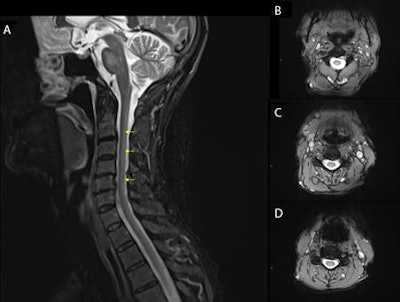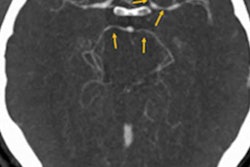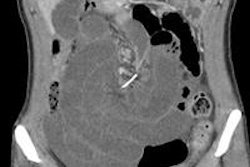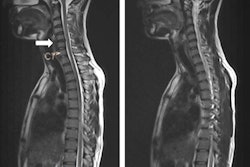
MRI helped diagnose copper deficiency myelopathy in a man who had lost feeling in both of his legs after long-term use of a denture fixative containing zinc, according to a new case report published online in BMJ Case Reports (7 August 2017).
The 62-year-old man had been referred to a neurology clinic after developing numbness, pain, and weakness in his legs. The symptoms had lasted for more than six months, according to the authors from Queen Elizabeth University Hospital in Glasgow, Scotland. MRI revealed spinal cord abnormalities, and the patient was diagnosed with the rare neurological disorder after several tests.
He had been using two to four tubes of denture fixative containing zinc every week for 15 years due to ill-fitting dentures. Excess zinc intake can interfere with copper absorption and lead to neurological problems in rare cases, the authors noted.
 Sagittal T2-weighted MRI sequence of the cervicothoracic spinal cord (A). Yellow arrows indicate subtle high T2 signal within the dorsal column of the cervical spinal cord extending from C2 down to C7 level. Axial T2-weighted image of the cervical spinal cord at the level of respective yellow arrows, descending (B, C, and D). Images courtesy of BMJ Case Reports.
Sagittal T2-weighted MRI sequence of the cervicothoracic spinal cord (A). Yellow arrows indicate subtle high T2 signal within the dorsal column of the cervical spinal cord extending from C2 down to C7 level. Axial T2-weighted image of the cervical spinal cord at the level of respective yellow arrows, descending (B, C, and D). Images courtesy of BMJ Case Reports.The patient didn't recover completely after discontinuing use of the fixative and taking copper supplements to treat his symptoms. A delayed diagnosis of copper deficiency myelopathy can lead to permanent nerve damage, according to the authors.
"Prompt recognition and treatment of copper deficiency myelopathy prevents progressive and likely irreversible neurological dysfunction," the authors wrote.
The full case report can be found here.



















